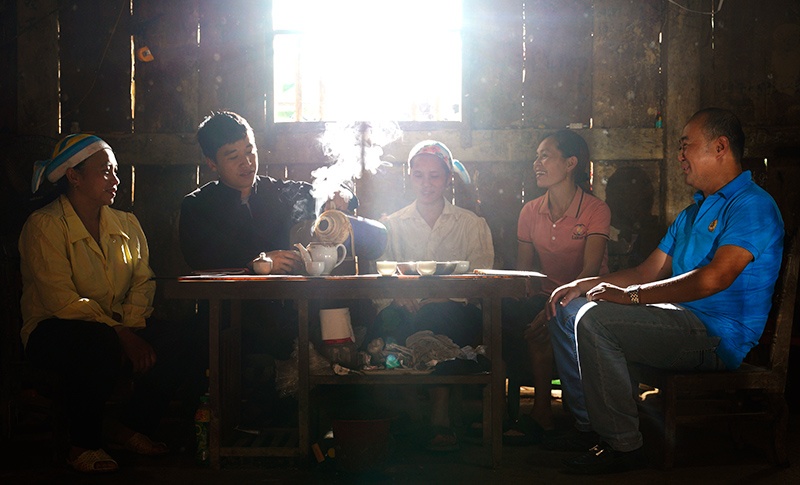COVID-19 sounds the call to invest in more resilient rural livelihoods
 |
| Francisco Javier Pichón - IFAD country director in Vietnam |
While a wide range of initiatives have been implemented to address the immediate needs of those farmers and rural returnees, long-term solutions are needed. Response to the COVID-19 crisis demands a stronger focus on mitigating risk and shocks and reinforces the need to maintain focus on the most vulnerable people while building resilience through sustained longer-term investments.
The experiences of the International Fund for Agricultural Development (IFAD) in assisting rural people in improving their livelihoods and resilience in a changing environment can provide some valuable lessons.
Profound impacts on rural communities
The COVID-19 pandemic is putting a strain on Vietnam’s rural economy, which is largely based on home-based self-employment, small or microbusinesses, and remittances from rural-urban migrants.
For smallholder farmers and rural small businesses, the pandemic, resulting in lockdowns, movement restrictions, and thus disruption to supply chains, means income losses. The lack of capital and access to credit and other financial services make rural producers less prepared to weather the COVID-19 economic storm.
At the same time, many migrant workers, who rely on low-wage manual labour jobs to support their families in rural areas, have lost their jobs due to factory shutdowns and lockdowns. Notably, according to a recent research brief by the International Labour Organization, more women were forced out of the labour force than men as they are typically employed in lower-quality jobs.
When the latest COVID-19 wave hit Vietnam’s southern cities and provinces this year, data released by the General Statistics Office of Vietnam shows that many rural migrants have returned to their hometowns from July to September, searching for a more secure life. The future of these rural returnees is, however, still challenging. They are now confronted with the same challenges that drove them to leave their hometowns in the first place, such as lack of employment and entrepreneurship opportunities and farmland scarcity. Those considering returning to cities are uncertain about when it is safe to do so. For those who decide to stay, it is a question of how to find sustainable livelihoods to settle down in their villages. Others may find themselves in the stay-or-go dilemma with no clear path forward, even in the short term.
In climate-change vulnerable areas such as the Mekong Delta, COVID-19 has caused a double crisis. Extreme and unpredictable weather events, exacerbated by climate change, such as prolonged droughts and seawater intrusion, have put crops and livestock farming at risk, threatening the residents’ bread and butter. To make matters worse, the COVID-19 outbreak, resulting in job losses and good supply disruptions, is making it harder for them to make ends meet.
 |
| COVID-19 sounds the call to invest in more resilient rural livelihoods |
Investing in more resilient rural livelihoods
Climate change, the COVID-19-induced reverse migration and supply chain disruptions have made it more critical than ever before the need to strengthen rural people’s resilience during times of uncertainty. In the medium and long term, we need an integrated approach to create viable and diverse livelihood opportunities for rural people.
Lessons learned from IFAD-supported projects and programmes in Vietnam emphasise the importance of enabling smallholder famers’, particularly low-income and woman-headed households’, access to different financial services, to invest in adaptive livelihood options and benefit from value chains. This can help them recover from the COVID-19 impacts and increase their resilience to a changing environment.
In many of its projects, IFAD has supported the establishment of saving and credit groups, often led by poor rural women, where members not only can apply for micro-finance loans but also gain farming production and business knowledge, financial education, and peer support, with particular attention given to the special needs of women, youth, and ethnic minorities.
To develop and revive the rural economy, it is crucial for smallholder farmers to cooperate with other actors such as farmer interest groups, cooperatives and especially the private sector in value chain development through inclusive capacity building and co-financing mechanisms.
The IFAD-financed Adaptation to Climate Change in the Mekong Delta (AMD) project in Ben Tre and Tra Vinh provinces provided financial incentives to smallholder households and farmers’ groups producing agricultural items via Climate Change Adaptation Fund (CCAF) co-financing programmes, and small- and medium-sized enterprises via a public-private-producer partnership (4P) programme. At the same time, the project strengthened the linkages between farmers and private businesses, and harnessed support from the local authorities to pave the way for implementing effective cooperation agreements between the two groups.
By matching CCAF-funded producer groups and 4P-supported businesses, the AMD project successfully formed rice, coconut, peanut, and handicrafts value chains in Tra Vinh, as well as garment, pig, and ornamental plants value chains in Ben Tre. Many of these rural businesses have also provided agricultural inputs and transferred knowledge and technologies to associated farmers, enabling them to produce higher quality products while following good agricultural practices.
Similar efforts should be planned, taking into consideration the new normal conditions, to assist rural inhabitants in improving their livelihoods in the context of the pandemic. For example, in June 2021, IFAD and the United Nations Industrial Development Organization (UNIDO) launched an intiative aiming to create a COVID-19-safe digital fruit value chain in Dong Thap and Ben Tre provinces. Funded by the United Nations COVID-19 Response and Recovery Multi-Partner Trust Fund, the project targets women and youth, who are among the most vulnerable groups to the pandemic.
While efforts are needed to ensure decent living conditions for rural migrant workers, we must not overlook the rural areas that are home to nearly 70 per cent of Vietnam’s population. Investing in rural livelihoods is one of the key strategies for Vietnam’s successful COVID-19 recovery, and that will help the country better prepare for future pandemics.
In the coming years, IFAD is committed to supporting Vietnam’s COVID-19 recovery efforts with a focus on building pro-poor and sustainable value chains and attracting more responsible private sector investments in rural areas, while expanding inclusive finance for climate-resilient rural livelihoods and fostering the environmental sustainability and climate resilience of ethnic minorities’ smallholder economic activities.
IFAD is an international financial institution and a specialised agency of the UN dedicated to eradicating poverty and hunger in rural areas of developing countries. Since 1993, IFAD has invested $408 million to finance 15 projects and programmes related to agricultural development in Vietnam, benefiting 749,470 households.
What the stars mean:
★ Poor ★ ★ Promising ★★★ Good ★★★★ Very good ★★★★★ Exceptional
Related Contents
Latest News
More News
- MAE names big 10 policy wins in 2025 (February 06, 2026 | 08:00)
- US firms deepen energy engagement with Vietnam (February 05, 2026 | 17:23)
- Vietnam records solid FDI performance in January (February 05, 2026 | 17:11)
- Site clearance work launched for Dung Quat refinery upgrade (February 04, 2026 | 18:06)
- Masan High-Tech Materials reports profit: a view from Nui Phao mine (February 04, 2026 | 16:13)
- Hermes joins Long Thanh cargo terminal development (February 04, 2026 | 15:59)
- SCG enhances production and distribution in Vietnam (February 04, 2026 | 08:00)
- UNIVACCO strengthens Asia expansion with Vietnam facility (February 03, 2026 | 08:00)
- Cai Mep Ha Port project wins approval with $1.95bn investment (February 02, 2026 | 16:17)
- Repositioning Vietnam in Asia’s manufacturing race (February 02, 2026 | 16:00)

 Tag:
Tag:




















 Mobile Version
Mobile Version